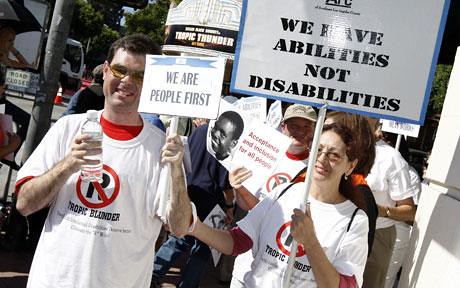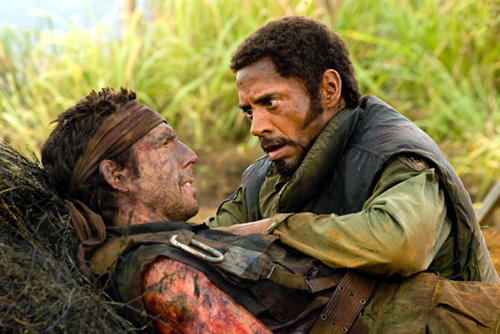
THIS WEEK IN THEATRES...
* Tropic Thunder, a knock-out brawl between Ben Stiller, Jack Black, and Robert Downey Jr. and the Hollywood that spawned them.
For more on the Tropic Thunder controversy, keep reading.
* Vicky Cristina Barcelona, Woody Allen goes abroad for a scintillating romantic drama about passionate, pretty people.
UPDATED TO CRITERION CONFESSIONS...
This week's reviews written specifically for the site are:
* Larisa Shepitko - Eclipse Series 11, two from the largely unknown Russian director, her first film Wings and her last, The Ascent
THIS WEEK IN DVD REVIEWS...
* The Anton Chekhov Collection, six discs with ten BBC adaptations of the master playwright's stage work.
* Blues in the Night, Anatole Litvak's lively 1941 picture attempting to bring jazz to Hollywood. Features director Elia Kazan in a supporting role.
* Derek, an illuminating documentary about pioneering queer filmmaker Derek Jarman.
* Extasis, featuring a young Javier Bardem in a Spanish thriller suitable for Tom Ripley.
* Joy House. Speaking of Tom Ripley, this film teams up Rene Clement and Alain Delon, the Purple Noon

I wrote my review of Tropic Thunder before the controversy over the "r-word" had erupted, and actually had posted it through the site before I had heard how much steam the protest had gathered. You can read an editorial by Timothy Shriver, the director of the Special Olympics, here. I can essentially see where he is coming from. I know for me when I hear the word "gay" used in a pejorative manner to mean "stupid" or "not cool," it bugs me, because there are so many other words that a person can use rather than one that also refers to a group of people and thus ends up equating that group with whatever bad thing the speaker is intending to denigrate. I considered amending my review, just to avoid punching the hot button with my full fist, but when it came down to it, I felt like my reference to the Simple Jack portion of the movie was all that really needed to be said about it. I think the reaction to the movie--which more or less has been a reaction to marketing using out-of-context lines from the film, which DreamWorks has since stopped--kind of misses the point. The exaggeration of Ben Stiller's Simple Jack character is a satire of actors trying to earn themselves a serious name by playing someone developmentally challenged. Naturally, since this is a satire, the portrayal of such is pushed to the next extreme, but one need only be paying a scintilla of attention to see who is really being made fun of in the context of the film. Stiller's Simple Jack is not much more exaggerated than Cuba Gooding Jr.'s Radio
What really convinced me not to change what I wrote to kowtow to the protesters was hearing Shriver on NPR. You can listen here. In the clip, Shriver admits to never having seen the film, meaning he is making assumptions about how the humor plays and beating his chest without having the whole story. I don't fault him for his compassion or his concern, but think about if this were a religious group making the same complaints about a movie with religious themes. When churches of various faiths complain about and demand boycotts of those films without actually seeing the final product, they are blasted by free speech advocates as being intolerant and for judging without having all the facts. Does this not cut both ways? Should not liberal causes be held to the same standards? And while a boycott is one thing we are all free to do, it seems like a touchy area when any group starts demanding changes be made. Who is the arbiter of what has gone too far, and who decides then to what degree it has to be dialed back?
Arguably, there is as much of a case to be made for a very small subplot in the movie regarding a character's homosexuality. It's featured in only two scenes, but based on the first scene and the other characters' reactions when his preference is mentined, you could judge solely from that one moment that what you are seeing is a negative portrayal of homosexuality without ever giving the movie its full due for how it ultimately handled the subject. Redemption is part of Tropic Thunder's thematic arc, but some would have us never make it to the point where anyone is redeemed.
Where something comes from and where it is going is of equal importance, I think, before praising or condemning any work of art or entertainment. Granted, Tropic Thunder never pauses and says, "Hey, that stuff you said about 'retards,' that's not good. You shouldn't even use the word," but I don't really think it should have to. Sure, some people may not get it without it being spoon fed to them, but I also think they'd spit the lesson out as soon as the spoon is pulled away. We shouldn't forget that the period of the Hays Code in Hollywood is not looked on entirely fondly. In fact, the self-imposed censorship by the Motion Pictures Producers and Distributors Association is the reason a lot of regularly lampooned Hollywood clichés exist, and their dictum that all criminals must be punished by the end of a movie is as laughed at today as we would likely scoff at any such mandate that all people with misguided points of view learn the error of their ways before closing credits. Hays existed to try to keep the government from censoring movies, but when corporations band together to stifle art so that they won't lose their revenue stream, it might as well be the government that's doing it. The line is very, very fine. With such readiness for capitulation already in place, is it any wonder that the blacklist was able to take such a firm hold in Hollywood? Despite the recent neoconservative spin on HUAC, trying to retrofit Joseph McCarthy's bully costume into a patriotic uniform, the suppression of ideas is never good and is a decidedly un-American activity. And it's in that spirit why I would never suggest Timothy Shriver not express his views, just ask him to gather more information before reacting. It's like Harlan Ellison says, "We are not entitled to our opinions; we are entitled to our informed opinions."
For some other voices, I point you to BadAzz Mofo, and David Walker's review. Dave is not afraid to be political when its required, or to call it like he sees it. You should track down any of his reviews of the aforementioned Mr. Gooding Jr.'s movies if you want some hilarious reading. Another good review, and like mine also likely written before the Simple Jack explosion, I point you to Eric Kohn's write-up at Premiere.com. Kohn gets even deeper into the meta than I do, and he also invokes the great Pauline Kael and quotes her to remind us of the difference between the humor Stiller is striving for and that which he is tearing apart:
From Downey Jr.'s purposely racist embodiment of African-American anachronisms to Black's scatological humor, everything in Tropic Thunder qualifies as satire, not spoof. It's an important distinction. Pauline Kael once noted that "unlike satire, spoofing has no serious objectives; it doesn't attack anything that anyone could take seriously; it has no cleansing power." Thus, the movie opens with inane fake trailers to introduce its fictional stars, surpassing the ones in Grindhouse for espousing actual ideas. Stiller offers a catharsis for everyone overburdened by bombastic storytelling, but even when the movie becomes playfully self-reflexive, it remains a keenly layered narrative. He returns to the movie-within-a-movie-within-a-movie metafilter so many times that the gimmick forces you to pay close attention and believe in the events as they transpire, without sacrificing the absurd edge of the equation.
As far as I'm concerned, it's up to Ben Stiller and his collaborators to listen to the voices inside themselves and know why they are doing what they are doing and stick to that. It's what we should demand of any of our artists: trust your own instincts to know that you need to say what you're going to say. By way of a personal anecdote, I have often amended my own work before I've released it because I've questioned how something might be taken. There is an important distinction, though, in that I do so before anyone else sees it. Once a work is out, criticism can lead to all kinds of self-doubt, but that can lead to dishonest knee-jerk reactions on the part of the artist and should be avoided.
For myself, I remember a scene in Cut My Hair
Anyway, as always, I welcome all other thoughts on the subject in the comments section. These are my thoughts on the matter, and they are offered in the interest of encouraging civil debate.

Current Soundtrack: Richard Ashcroft, "Why Not Nothing?" & Arthur Lee, "Hamburger Breath Stinkfinger"
Current Mood:

e-mail = golightly at confessions123.com * Criterion Confessions * Live Journal Syndication * My Corporate-Owned Space * ComicSpace * Last FM * GoodReads * The Blog Roll * DVDTalk reviews * My Books On Amazon
All text (c) 2008 Jamie S. Rich


6 comments:
The controversy reminds me of Kate Winslet's great bit in the first season of Extas.
It didn't even occur to me that there would be a controversy when i saw it, thinking the satire was pretty clear.
Other than that, i don't really get too worked about up about the differences between satire and spoof, as long as it's funny.
wallflower
Hey Jamie!
I do remember the "clothes fag" reference to which you allude. And you know, though I usually hate that phrase, it worked on the level that it personified the character... and *also* the time, place, and circumstances that the novel takes place. You never went "over the top" to paint the timeline either, and such subtlties as the vernacular really created this setting.
So as far as I'm concerned, you did quite well. :)
So, wait, it's still in there? I didn't remember adding it back in. Maybe I used the f-word more than once originally, then. Because the place I thought he said it, the one quoted, doesn't have it. Or are you someone I know with a copy of an older draft, Anonymous?
It's not at all abnormal for me to not remember my own writing. It tends to fall out of my brain after a while. Interesting, though, if I don't remember ultimately settling this internal debate in favor of my first instinct, forgot, and then have been kicking myself all these years for no reason. "You didn't kill your brother, it's not your fault!" :)
Hey again, Jamie!
"Anonymous" is me, Bren Collins :) - but yeah, it's totally in there, referring to the Phil character! I had to look it up in my copy. Page 78, third paragraph up. Now, mine was the August, 2002 edition - maybe it was changed after that?
But either way, it didn't strike me in an offensive way. It was an eye-catching word, but you can't possible "politically correct" every single reference in a person's vernacular and still make for a believable story. Frankly, I'll take a few harsh words over a piece of writing that reads false due to self-censorship any day of the week.
Truly, "Cut My Hair" is completely plausible. I still recommend it to people loking for something cool-yet-challenging to read :)
Oh, dang. There it is. I was looking at page 80. I guess I must have changed it back before going to press, for all the reasons I regretted not doing so.
Thanks for looking, and thanks for the thoughts. I like that on 115 someone else calls Mason a "faggot," and though nothing is made of it as far as pointing it out, it does seem a little karmic.
Post a Comment